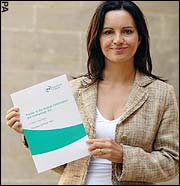
Ban on sex selection
could be lifted
By Nic Fleming, Medical Correspondent
(Filed: 17/08/2005)
The ban on couples having fertility treatment in order to choose the sex of their baby for reasons of family balance could be lifted, it was announced yesterday.
Changes to regulations that allow selection only in cases where there is a risk of a baby being born with a hereditary disease that only affects one sex - such as haemophilia - are being considered as part of a review of fertility laws.
 |
|
Wider use of embryo screening, greater regulation of sales of sperm and eggs on the internet and the requirement for IVF clinics to consider the welfare of the child including its need for a father are also under discussion.
The Commons science and technology select committee in March said in a report on assisted reproductive technologies that: "We find no adequate justification for prohibiting the use of sex selection for family balancing."
Launching a public consultation on changes to the Human Fertilisation and Embryology Act 1990 yesterday, Caroline Flint, the public health minister, said it was "time to debate" whether couples should be allowed to have treatment to ensure they had a boy or a girl.
"We have asked the question on family balancing. There are important and complex questions to be asked but I do think that we need to ask these questions," she said.
The public consultation is also seeking views on how many children of one gender a couple would need to have had before being given access to sex selection.
While many scientists believe recent advances have made the HFE Act out-dated, many ethical campaigners and religious groups are deeply opposed to many of the changes being considered.
John Harris, professor of bioethics at Manchester University, said: "I welcome the review. If it's not wrong to wish for a bonny, bouncing baby girl, how can it be wrong to use technology to play fairy godmother to ourselves?
"Sex selection should be a matter of individual choice and the principle should be that unless palpable harm can be demonstrated, people should be free to make their own choices."
David King, the director of Human Genetics Alert, said: "Social sex selection should not be allowed because it turns children into consumer items and allows gender stereotypes to determine who gets born. It will throw the door to designer babies wide open."
Belgium and Jordan allow sex selection for family balancing. In Israel if a couple has four children of one sex, they can have treatment to have one of the opposite sex.
During a public consultation by the Human Fertilisation and Embryology Authority two years ago, 80 per cent of people opposed sex selection.
The Department of Health consultation, which runs until Nov 25, will also consider changes to rules on storage of embryos for fertility treatment, following the case of Natalie Evans, who is fighting a legal battle to use a frozen embryo despite her estranged partner withdrawing his consent.
The present position that a stored embryo should be destroyed if one of the couple that produced it requests it could be amended.
An embryo could be kept for up to 10 years and if consent for its use in treatment was not received by then it would be disposed of.
Also under examination is whether to allow wider use of pre-implantation genetic diagnosis (PGD). This is a screening technique used for couples with a family history of serious hereditary conditions that will affect a child from birth, such as muscular dystrophy, allowing them to choose embryos that will not be affected.
Some believe PGD should be used to screen out embryos for conditions such as some breast cancers that may not develop until late in life or may not even occur at all.
Others fear such a change would be a step on a slippery slope leading to the creation of designer babies, where all defects are screened out.
Internet sites that offer sperm and eggs are to fall under the expected revised legislation. The Government is considering whether to ban such services or regulate them to improve safety and quality.
The role of the HFEA, to be merged with the Human Tissue Authority in 2008, will also be examined.
Lord Winston, professor of fertility studies at Imperial College, London, said: "There is a clear case for thoroughly examining the clinical regulation of IVF to see if continuing with a body such as the HFEA is justified.
"It is difficult to see why this one aspect of clinical treatment should be singled out for such regulation. Sex selection will probably happen in the next 10 years irrespective of IVF regulations."
It is illegal to place a human embryo into an animal or vice-versa to create hybrids and the mixing of human and animal gametes is severely restricted.
Some scientists want this law relaxed to allow them to study such things as the capacity of embryonic stem cells to differentiate into a range of bodily cells as part of research into diseases.
The review will consider whether to allow the creation of human-animal hybrid embryos up to a limit of 14 days for research purposes.